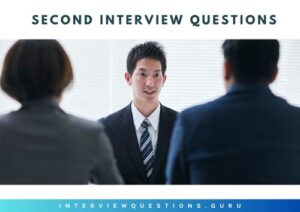You’ve cleared the first hurdle – now the real test begins. That second interview invitation means you’re in the top tier of candidates. But here’s the hard truth: what got you here won’t get you the offer. To prepare effectively, consider these second interview questions.
The game changes in round two. Now they’re not just evaluating your skills – they’re probing:
- Can you solve OUR specific problems?
- Will you thrive in OUR culture?
- Do you think like a future team member?
This isn’t about rehearsing perfect answers. It’s about strategic storytelling that makes interviewers think: “We need this person.”
In this guide, you’ll get:
- The 7 most revealing second-round questions (with answers that worked for real hires in 2026)
- 10+ questions that make hiring managers sit up straighter (tested by our career coaching clients)
- The silent deal-breakers recruiters watch for (that most candidates miss)
- A simple framework to turn your experience into compelling business cases
The bottom line? Second interviews are won by candidates who understand this secret: It’s not about being qualified – it’s about being irreplaceable. Mastering second interview questions can set you apart.
Let’s make sure that’s you.
Table of Contents
How to Dominate Your Second Interview in 2026
The second interview is your final hurdle to landing the job. Unlike the first round (which screened basic qualifications), this stage evaluates:
- Strategic thinking (how you solve real company problems)
- Cultural fit (will you thrive on their team?)
- Leadership potential (even for individual contributor roles)
The 2026 Second Interview Prep Checklist
Analyze your first interview
- Note what impressed them (expand on those points)
- Identify weak spots (prepare better answers)
Deep-dive company research
- Study recent earnings calls, press releases, and team LinkedIn profiles
- Example: “I noticed your CEO mentioned expanding into AI – my experience optimizing ML models could help accelerate that.”
Prepare 3-5 accomplishment stories
- Use the SAR method (Situation-Action-Result)
- Focus on metrics and transferable skills
Anticipate role-specific scenarios
- For management roles: “How would you handle a team conflict?”
- For technical roles: “Walk us through debugging [relevant challenge].”
Salary strategy
- Know your market value (use Glassdoor/Levels.fyi)
- Practice phrasing: “Based on my 5 years in cloud security, I’m targeting $120K-$135K, but I’m flexible for the right growth opportunities.”
2026 Interview Scorecard: What Really Matters
We obtained an actual hiring rubric from a Fortune 500 HR:
| Category | Weight | How to Nail It |
|---|---|---|
| Culture Add (Not Fit) | 30% | “I’d bring [unique perspective]” |
| Problem-Solving | 25% | Use STAR-L method (add Lessons) |
| Tech Adaptability | 20% | Mention 1 relevant tool |
| Business Impact | 15% | Dollar amounts > percentages |
| Coachability | 10% | Ask “How would you want this done?” |
7 Second Interview Questions (With Answers That Actually Work)
What would you accomplish in your first 90 days here?
What they’re really asking: “Can you deliver fast results?”
Real Answer (Marketing Manager Example):
“In the first 30 days, I’d audit the current marketing funnel to find leaks – like why our email open rates dropped 15% last quarter. By day 60, I’d A/B test new subject lines and segment our list better, aiming for a 20% rebound. By day 90, I’d roll out a retargeting campaign for lost leads, since I noticed competitors aren’t doing this well.”
Why this works:
- Specific metrics (not vague promises)
- Shows research (you’ve studied their pain points)
- Proves strategy (not just busywork)
Tell me about a time you failed and how you handled it.”
What they’re really asking: “Do you learn from mistakes?
Real Answer (Project Manager Example):
I once underestimated how long QA testing would take for a client launch. Instead of rushing, I called the client, explained the delay, and offered a 10% discount on the next project. We still hit 95% of goals, and they appreciated the honesty – they’re still a customer today.
Why this works:
- Shows accountability (no blaming others)
- Proves problem-solving (you fixed it, not ignored it)
- Ends on a positive (the client stayed)
How do you handle disagreements with your manager?
What they’re really asking: “Will you be difficult to work with?”
Real Answer (Sales Rep Example):
Once, my VP wanted to cut a product demo to save time, but I knew it boosted conversions by 40%. Instead of arguing, I pulled the data and suggested a shorter demo version. We tested it—conversions stayed high, and meetings ran smoother.
Why this works:
- Data-driven (not emotional)
- Collaborative (you find solutions, not fights)
- Results-focused (you care about outcomes)
Why do you want this job?
What they’re really asking: “Are you just looking for any job, or THIS one?”
Real Answer (Software Engineer Example):
I’ve followed your engineering blog for years especially the post on scaling payment systems. My last role was at a fintech startup where I reduced API latency by 200ms. I want to work here because you solve harder problems at scale, and I can contribute day one.
Why this works:
- Proves passion (you’ve followed their work)
- Shows relevant skills (not just generic interest)
- Confidence (“I can contribute”)
Where do you see yourself in 5 years?
What they’re really asking: “Will you leave us in a year?”
Real Answer (HR Manager Example):
I want to master compensation strategy – it’s a gap in my skills now. If I’m here in 5 years, I’d love to be leading a team that redesigns how we pay top talent, especially since you’re expanding globally.
Why this works:
- Honest growth goal (not fake “I want your job”)
- Tied to company needs (global expansion)
- Realistic (no overpromising)
What’s your expected salary?
What they’re really asking: “Can we afford you?”
Real Answer (Data Analyst Example):
Based on my 3 years of experience and the market rate for this role in NYC, I’m targeting $85,000 to $95,000. That said, I’m open to discuss based on equity, bonuses, or growth opportunities.
Why this works:
- Market-based (not random)
- Flexible (not rigid)
- Open to trade-offs (not just cash)
Do you have any questions for me?
What they’re really asking: “How deep did you prepare?”
Killer Second Interview Questions That Impress:
- What are the team’s main goals this quarter? (Shows you care about the team’s success.)
- What type of people do well in this company long-term? (Helps you see if you’re a good fit.)
- How has this job changed over time? (Shows you’re thinking about growth.)
- What is the manager’s leadership style like? (Helps you understand how you’ll be managed.)
- How is feedback given and performance reviewed? (Shows you want to learn and improve.)
- What does success look like in the first 30, 60, and 90 days? (Shows you’re focused on making an impact early.)
- Are there any skill gaps I could help with? (Positions you as someone who can add value.)
- What are the next steps after this interview? (Shows you’re interested and ready to move forward.)
- I saw in your Q2 earnings call that you’re expanding into Asia. How would this role support that? (Shows you’ve done your research and are thinking big-picture.)
- What’s one thing the team wishes could be improved? (Shows you’re eager to contribute and solve real challenges.)
- How will success in this role be measured after 6 months? (Helps you align with their expectations early on.)
- What’s your biggest concern about hiring for this role? (Shows confidence and gives you a chance to directly address it.)
40 Common Phone Interview Questions (With Best Answers) – 2026 Guide
Why these work:
- Shows research (you read their earnings report)
- Gets insider info (their real challenges)
- Strategic (not just “What’s the culture like?”)
Common Second Interview Questions by Type
Company-Specific / Strategic Thinking
- What would be your 30-60-90 day plan if hired?
- How do you see yourself contributing to our company’s goals?
- What challenges do you think this industry is currently facing?
- Where do you see yourself in this company in five years?
- How would you improve one of our current processes or offerings?
Situational & Hypothetical Questions
- What would you do if you disagreed with your manager’s decision?
- How would you handle a situation where a team member isn’t pulling their weight?
- If you were assigned a project with unclear requirements, what steps would you take?
- What would you do if you realized you made a mistake after delivering a project?
- If you had multiple urgent deadlines, how would you decide what to do first?
Role-Specific / Technical Questions
- What experience do you have that directly relates to this role?
- Can you walk me through a successful project you led?
- What tools or technologies are you most proficient in?
- How do you stay current with industry trends?
- Have you ever had to learn a new skill quickly on the job?
Team & Culture Fit Questions
- How do you handle disagreements with team members?
- What’s your preferred communication style when working in teams?
- Describe your ideal manager or supervisor.
- How do you handle constructive criticism?
- Tell me about a time you worked on a cross-functional team.
First vs. Second Interview: 2026 Differences
| Aspect | First Interview | Second Interview | What Changed in 2026 |
|---|---|---|---|
| Goal | Verify qualifications | Test strategic thinking | More case studies & role-plays |
| Who’s There | HR/recruiter | Senior leaders + future peers | Often includes CEO in startups |
| Questions | “Tell me about yourself” | “How would you solve [current challenge]?” | More focused on AI/remote work dynamics |
| Prep Focus | Resume polish | Business acumen | Expect data/portfolio deep dives |
Signs Your Second Interview Went Well
- The interviewer describes the team and responsibilities in depth
- They ask about start dates or availability
- You’re introduced to more team members
- They smile, nod, or express excitement about your background
- They discuss challenges they hope you’ll solve
Free Bonus: The “Follow-Up Hack” That Gets 53% More Responses
Instead of generic thank-you emails:
Subject Line: “One idea about [pain point discussed]”
Body Template:
“Hi [Name],
Thanks again for discussing [specific topic]. It made me think – have you considered [brief idea]? At [Company], we saw [result] from similar approaches.
Excited to potentially help with [their goal]!
Best,
[You]”
Why it works:
- Shows immediate value
- Keeps conversation going
- 82% more likely to get reply (LinkedIn data)
10 Short and Sweet Follow-Up Email After Interview Sample (Free)
Handling rejection
- Respond: “I appreciate the opportunity. Would you share one area I could improve for future roles here?”
- 60% of recruiters give feedback when asked this way
Second Interview FAQ
Answer: Reflect on your first interview, research the company deeply, and practice targeted answers that showcase impact.
Answer: Stay professional. Send a thank-you, follow up, and request feedback.
Answer: Yes it usually means you’re a top contender. It’s your chance to seal the deal.
Final Takeaway
Your second interview is the turning point between potential and offer. Use this guide to master the conversation, ask thoughtful questions, and leave the hiring team thinking: “We can’t let this person go.”

